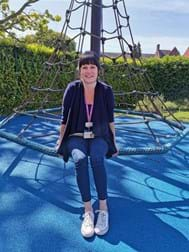“Children are so resilient. Some young people we see have had so much loss and grief; they truly amaze me how they can keep going.”

Children’s Grief Awareness Week spearheaded by charity, Grief Encounter falls on the 19-25 November 2020. This year we are likely to see a significant increase in the number of children who will be experiencing grief, for a range of reasons. This is our opportunity to show support for children at the most vulnerable time in their lives.
Andrea Samways is the Clinical Team Lead for Portsmouth Child and Adolescent Mental Health Service (CAMHS) Looked After Children’s (LAC) Team. We spoke to Andrea to find out more about the work the team does to help children in many different circumstances, overcome grief.


Andrea Samways
“The work we do surrounding grief is so varied. We work with children who have suffered a bereavement, a physical loss of a loved one and unfortunately, as well as ill health and other factors that result in a death, a few children that come into the care system have had parents who have sadly taken their own lives. However, grief can manifest in several different ways within the LAC service.
Andrea continues, “there is often the grief of a family unit. A child might have experienced abuse whilst in the care of their family and as a result have come into the care system. Despite the abuse, the loss of a biological connection, the home they had been used to, means they often feel a loss of a sense of belonging - they might start to grieve for the family unit they so desperately needed and wanted.
“Sometimes when children come into care, they are separated from their siblings. This is separation at the worst possible time and also a great loss for them to deal with. More often than not the older siblings in this scenario, would have taken on a caring role for their brothers or sisters. When that is taken away due to a separation, or a Foster family has come in a taken over the role of the parent, the older sibling may feel helpless, as though they’ve lost their purpose. It can be very de-stabilising for them.”
Andrea explains the kind of work they do to help these children move forward and learn to deal with their grief. She said “to help these children cope and start to understand loss and the grieving process, we use something called ‘Continuing Bonds’. A child can lose a parent due to suicide, ill health or relationship breakdown. This work is about continuing a connection with them whilst they are not alive or living with them, working to keep their loved ones alive in their life through activities.
“It could be that we help them bake a certain cake, making something that their mum used to make for them; a memory forms a sensory connection with that particular person. It could be making memory boxes to keep that person in their minds or simply talking about their loved more often – it’s really about finding things that connects them and incorporating it in their lives as much as possible. Each child is different."
But it’s not always easy, as Andrea explains “As helpful as this process is, it can be really painful. These children are taking their first steps to addressing their pain; we often see them stuck on the anger cycle. They are angry at the life they haven’t had, the family they have lost, the siblings they have been separated from through no fault of their own.
“To help combat this we get the children to try and name their feelings, acknowledging what has happened so they are able to get past the anger and start the process of therapy and moving on. The start of this process is the hardest. These children are often in survival mode and they haven’t a space to stop and reflect. Their emotional development is often delayed, and they have not had anyone to validate their feelings. If we can help them understand what they are feeling, providing them with a safe space, we can start to build up the language to be able to communicate and name their distress, helping to reduce the anger they have.
“Children are so resilient. Some young people we see have just had so much loss and grief; they truly amaze me how they can keep going. No two young people on our caseload are the same and they are all going through different things, but our main aim is to do the absolute best by them.
“We are with them every step of the way to get them to a place where they can move on with their life and collectively, all of us in the child’s ‘Network’, the carers, social workers, teachers and so on, are all on the same page. We work to ensure that their grief does not define them and that they have every opportunity to make a bright future for themselves. All we ask is that we all stop to think of a child we know and then imagine how you would support them with grief. Then consider how to lend a helping hand.”
There is a severe shortage of Foster Carers across Hampshire, with many siblings facing being separated through no fault of their own. If you are interested in Fostering, you can find out more here:
https://foster.portsmouth.gov.uk/
https://www.southampton.gov.uk/health-social-care/children/fostering/
https://www.hants.gov.uk/socialcareandhealth/adoptionandfostering/
To find out more about Children’s Grief Awareness week please visit: http://www.childrensgriefawarenessweek.com/